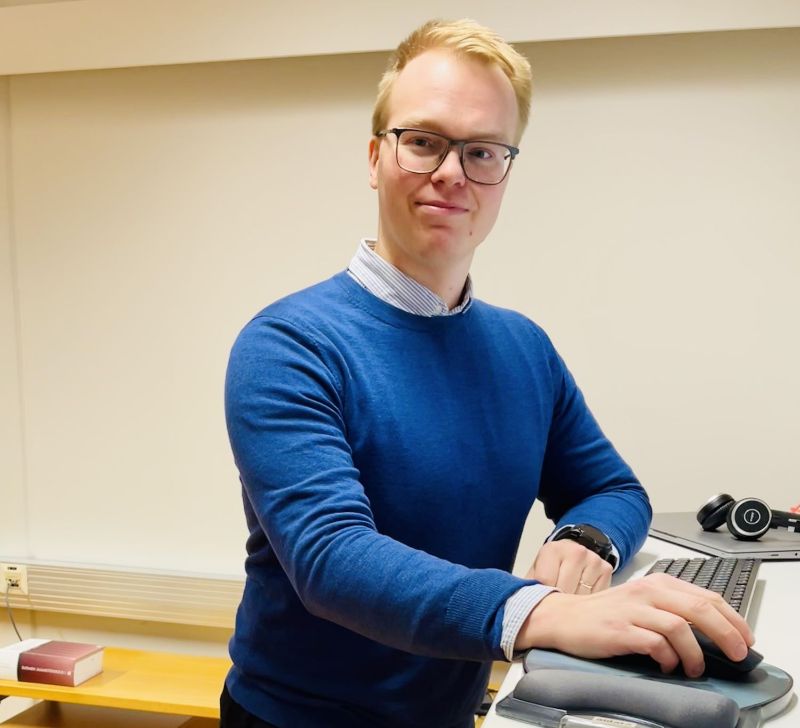Public legal aid attorney
"The best part is helping people. It feels nice to receive positive feedback from clients. I also like the versatility of my work. In this profession, legal competence develops in an extensive manner, as there is such a wide range of cases. Many of them are such that, during my studies, I could not even imagine coming across such problems."

- Sampsa Luttinen
- Public legal aid attorney at the Legal Aid Office of Central Finland.
- Graduated as a Master of Laws from the University of Lapland and qualified as an attorney-at-law and deputy judge.
- Four years of work experience in the field.
Briefly explain what you do for a living.
I work as a public legal aid attorney, which in practice means working as a lawyer for the state. At the State Legal Aid Office, I help people with diverse legal problems within the limits of the Legal Aid Act. Most of the cases are related to criminal matters and inheritance and family law issues, but, as a whole, there are various different types of cases.
How have you ended up in the profession of your choice?
I used to work in business law, but after my court training, I became interested in matters to do with criminal, family and inheritance law. In the final stages of my court training, I submitted an open application to the Legal Aid Office of Central Finland, and I am still on that path.
Describe your typical working day or week.
The working days and weeks vary a great deal depending on whether I have a hearing, receive new cases, or simply work on existing cases. For example, this morning I started the day by checking my emails and browsing the legal information service Edilex. I use it to check the news and latest updates in legal practices. Thereafter I had a morning coffee with my colleagues, after which I did my shift in the chat service of the Legal Aid Office. After lunch, I received two new cases, the first of which relates to estate inventory and the second to assisting a complainant in criminal proceedings.
What kind of work environment or working hours do you have?
I usually work at the Äänekoski office, but sometimes I work remotely from home. I occasionally visit the office in Jyväskylä, where I also meet other colleagues from the Legal Aid Office of Central Finland. On days when the court is in session, I usually attend the Central Finland District Court in Jyväskylä or somewhere else in Finland.
Public legal aid attorneys do not have specific working hours, and we are not covered by working time legislation, but I try to work mainly during office hours. Sometimes the sessions stretch longer.
What kind of competence or qualities are required in the profession?
This is a customer service-oriented profession in which you need to get along with different kinds of people. Naturally, you must also be familiar with legal matters. In addition, you need interaction skills, as you work in cooperation with other office staff and legal aid secretaries, who contribute considerably to tasks such as preparing estate inventories.
In this job, you learn to work with different kinds of people. Many clients are going through a personal life crisis, and experience makes it easier to meet and support them in the challenging situation.
What is the best thing about your profession?
The best part is helping people. It feels nice to receive positive feedback from clients. I also like the versatility of my work. In this profession, legal competence develops in an extensive manner, as there is such a wide range of cases. Many of them are such that, during my studies, I could not even imagine coming across such problems.
What are the downsides of the profession or what seems challenging?
At first, the challenging cases make you wonder whether it is even possible to do anything in the situation. In general, a solution can be found: help is available online and advice from colleagues is indispensable. Quite often, someone has already had an identical or at least very similar case and they often help to get to the heart of the problem.
Another downside is that sometimes clients are in a really unpleasant situation. It is important to let go of your own feelings relatively quickly in order to focus on helping the client. In this work, you need to be empathetic to an appropriate level, as it is the task of a public legal aid attorney to be a person who is able to examine the situation from the outside and find the best solution.
What would you tell a person considering the profession of public legal attorney?
The work is varied and it allows you to develop as a legal professional in an encouraging atmosphere. The state offers good occupational health care and long holidays.
How do you see the future of your profession?
I am somewhat certain that artificial intelligence will not replace our profession, at least any time soon. Many people have bigger or smaller legal problems at some point of their life. Public legal aid attorneys will continue to be needed in such situations.
The interview was conducted in cooperation with the Oikeus.fi website.
